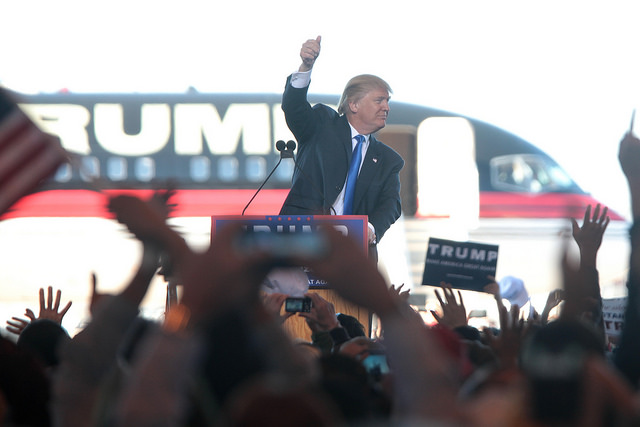What makes Donald Trump special? This is a question the man himself would presumably have little trouble answering. But for those of us interested in projecting his political future, trying to determine whether he represents an outlier or something far more significant, it is proving considerably more tricky.
Is it his protectionist approach to trade? His willingness to discriminate against particular ethnic and religious groups? His failure to play by the unspoken rules of political engagement? Depending on how far back you are prepared to go in American history, it is possible to answer to all of these questions with either a “Yes” or a “No”.
Protectionism largely fell out of favor with the rich and powerful once the nation became a superpower during World War II, yet was strongly supported by many politicians before then. While racism has played a largely covert role in conservative platforms over the past few decades, it provided the foundation for George Wallace’s insurgent campaigns in 1968 and 1972. And there have been numerous instances of candidates crossing lines of civility and decorum, whether directly or through their advertising, though Trump has certainly done so with unusual force. To the extent that his campaign feels unprecedented, then, it cannot be for these reasons alone.
If we take a step back from the controversies Trump has been stirring up, it becomes easier to see that his greatest political innovation is not what he advocates, so much as how he advocates it. Much has been written about his masterful manipulation of the ever-shortening news cycle, consistently finding ways of keeping his name “above the fold” without having to pay for the privilege.
We need to be more specific than that, though. It isn’t simply Trump’s skill at generating clickable headlines that sets him apart. What truly sets him apart is his intuitive grasp of the rapidly shifting relationship between headlines and the stories they promote.
Perhaps the single most important aspect of the contemporary media landscape is the degree to which content is perpetually in flux. Stories that used to be fixed when a paper was put to bed or a broadcast aired will now change many times over a short period of time. Even the world’s most venerated news organizations like The New York Times regularly publish articles before reporting is finished, filling in blanks or making factual clarifications in revisions that take place hours, even days, after they have gone live. And the less traditional seat-of-the-pants operations that have sprung up during the social media era have elevated this approach to a basic principle.
This instability leads to a lot of confusion. Time and again, people will share a story only to find that the part they wanted to highlight has been substantially altered or removed entirely before their friends can read it. Factual errors vanish. Quotes are refined and expanded. And headlines get rewritten, sometimes more than once, with significant implications. Frequently, even when everyone is discussing the same story, they are discussing versions of it different enough to make coming to any sort of understanding difficult.
Together with the leveling effect that the internet has had over the past two decades, stripping much of the framing that used to mark content as legitimate or dubious, this lack of fixity contributes to a situation in which the consequences for spreading falsehoods are substantially diminished. It’s not that the truth has altogether ceased to matter, but that the difficulty of pinning it down creates opportunities for those who do not worry about being eventually proven wrong.
This is where Donald Trump has demonstrated unparalleled mastery. He might not be rhetorically disciplined or ideologically consistent. He might have an aversion to the nuts-and-bolts work of building a traditional campaign apparatus. He might not even want to win the election that badly, as some pundits have argued. But he knows how to maximize the power of statements that resist verification, either because they are too broad to test or because they are attributed to sources that cannot be tracked down.
This approach works particularly well in English, which, unlike many languages, does not have a convenient way of grammatically distinguishing statements of fact from statements of opinion. Trump needs only to say, “I have heard that x or “People know that y to be able to disseminate notions without claiming ownership over them.
Mind you, almost all successful politicians are good at being rhetorically elusive. That’s why they are so fond of the passive voice and sentences that make no truth claims. What sets Trump apart is not this studied imprecision so much as his intuitive grasp of a media landscape in which it can almost be foolproof. If the news itself is in a state of constant flux, tying a politician to a particular statement long enough to make people care that it is false will be very hard indeed.
In retrospect, Trump’s decision to represent the interests of the “birthers” who believed that President Obama was not born in the United States provided him with a way of experimenting with the techniques he has perfected during the Republican primaries. He disseminated rumors and posed questions without ever fully committing to the inanities espoused by participants in this benighted movement. That allowed him to build a political base without the risk of being discredited as a full-blown conspiracy theorist.
For all the outrageous things that Trump has been accused of saying during his presidential campaign, the vast majority fall into the category of secondhand information he is passing on rather than unequivocal assertions. Because headlines are too compact to convey this distinction effectively, he regularly ends up with grounds for complaining that his words have been distorted. That’s why his recent ire at The Washington Post, however exaggerated, can easily be interpreted as legitimate by his supporters.
No doubt fully aware that anything he said about the weekend’s mass shooting in Orlando, Florida would receive intense scrutiny, Trump repeatedly excoriated the president for failing to respond adequately to the threat posed by what he called “radical Islamic terrorism.” In comments he made to Fox News, he said Obama “doesn’t get it or he gets it better than anybody understands — it’s one or the other, and either one is unacceptable.”
This led the Washington Post to run a story that was initially given the headline “Donald Trump suggests President Obama was involved with Orlando shooting.” Although the newspaper later altered this to “Donald Trump seems to connect President Obama to Orlando shooting” of its own accord, he made a big show of canceling its press credential because of the original wording.
Those who have discerned fascist tendencies in the Trump campaign have cited a range of evidence, from the aggression his speeches seems to stir up against protestors at his events to his insistence that the United States needs a strong leader for a change. But his facility for simultaneously ignoring the details in his own proposals while focusing intently on the way his detractors deploy them, reacting to every misrepresentation and exaggeration of his words as a major slight, is one of the most compelling reasons to connect him with men like Mussolini, Franco and even Hitler.
Joseph Goebbels, the latter’s tactically brilliant Minister for Propaganda, had a rare gift for exploiting the divide between what his Führer actually stated and what he implied. Whenever someone conflated the two, Goebbels’ team would pounce, underscoring the negative bias in coverage of the National Socialist movement.
For all of his bluster, Trump hasn’t come close to reproducing the outrageous notions that the Nazis were all too happy to spread. Nor is he ever likely to do so, despite what his opponents darkly portend. But he demonstrates a similar willingness to use their words to fuel, with the added twist that he is able to turn the instability of the news in the internet era to even greater advantage. If you can hold others to their words long after they have been modified, while managing to disown your own heated rhetoric whenever it is convenient, you will win the news cycle time and time again.
Photograph courtesy of Gage Skidmore. Published under a Creative Commons license





